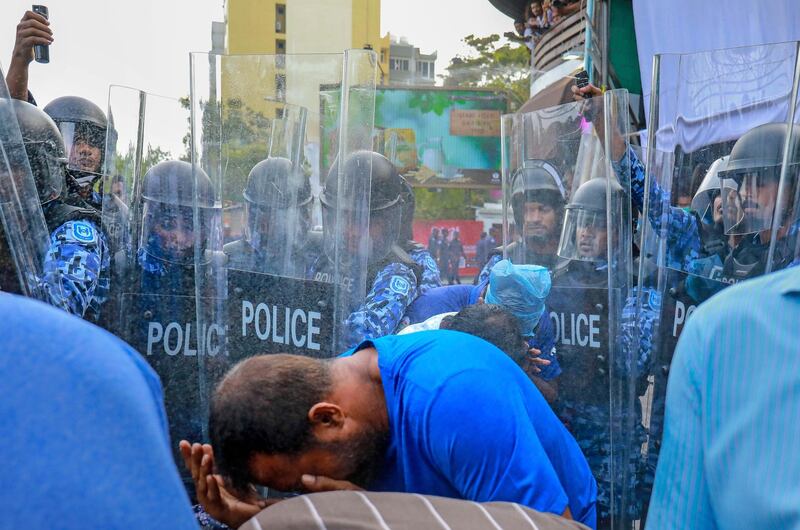For days after the political crisis in the Maldives began, speculation of a particular kind swirled around New Delhi: would India send troops to settle the brouhaha in its backyard?
India even had an invitation, of a sort. As soon as President Abdulla Yameen declared a state of emergency and arrested two judges and a former president on February 6, Mohamed Nasheed, another former president now in exile, called for India to intervene.
“We would like the Indian government to send an envoy, backed by its military, to free the judges and the political detainees,” said Mr Nasheed, who divides his time between Colombo and London. “We are asking for a physical presence.”
There was precedent as well. In 1988, asked to step in during a coup in the Maldives, India flew 1,600 troops to the Indian Ocean archipelago to help the government regain control. The intervention was widely praised. In the US, President Ronald Reagan called it “a valuable contribution to regional stability”. British prime minister Margaret Thatcher said: “Thank God for India.”
In this ongoing crisis, however, India has refrained from stepping in. At least two people with knowledge of the government’s deliberations insist that the option was never seriously discussed.
In some part, this had to do with the differences between the 1988 coup and the current situation, which was triggered by the Maldives supreme court ordering the reinstatement of opposition MPs sacked by Mr Yameen. But India’s decision also reflects how dramatically the dynamics of power in the Indian Ocean have altered over the past three decades, and how the crisis threatened to provoke a great-power struggle between India and China.
"The major difference between the two cases is that, in 1988, the sitting president was the one who invited Indian troops to suppress the coup," said Sushant Singh, a former lieutenant colonel in the Indian army who wrote the book Mission Overseas about the 1988 Maldives operation.
“Here it’s an exiled opposition leader asking India to go to Maldives,” Mr Singh said, pointing out that it would set a poor diplomatic precedent to respond to such a call.
Just as significant, though, is the recent rise of China.
China has backed Mr Yameen’s government, and last week Beijing explicitly warned India to stay away.
"If India one-sidedly sends troops to the Maldives, China will take action to stop New Delhi," an editorial in the state-run Global Times said. "India should not underestimate China's opposition to unilateral military intervention."
_______________
Read more:
[ Ex-leader wants India to intervene to free Maldives judges ]
[ Maldives government in standoff with supreme court ]
_______________
Under Mr Yameen, the Maldives has expressly cosied up to China over India, the traditional regional power. Last December, Mr Yameen’s government signed a free-trade pact with China, and agreed to be part of Beijing’s trillion-dollar “One Belt, One Road” (Obor) infrastructure network.
Since 2013, when Mr Yameen replaced Mr Nasheed as president, the Maldives has received hundreds of millions of dollars in Chinese investment infrastructure, developing, among other things, a bridge between two of its most important islands and an international airport.
By accepting this investment, Mr Nasheed has said, the Maldives is walking into a “debt trap”, doomed to consign the infrastructure to Chinese ownership when it fails to repay these loans.
For India, dispatching troops to the Maldives when it has placed itself so firmly within Beijing’s embrace would only result in yet another source of friction with China, Mr Singh said.
The two powers already clash on several fronts. Last year, Indian and Chinese troops entered a tense standoff in the Doklam valley in Bhutan. China also continues to claim parts of the Indian state of Arunachal Pradesh.
China’s growing influence, through Obor, over India’s neighbours — Sri Lanka, Nepal, Bhutan and Pakistan — worries New Delhi. T P Sreenivasan, a retired diplomat who served as India’s ambassador to the UN, called OBOR “a grandiose project aimed at global domination through connectivity and infrastructure”.
The “Chinese factor” served as a major deterrent to India’s plans to intervene in the Maldives, Mr Singh said. “In 1988, China’s influence here was very limited. That is far from the case now.”





